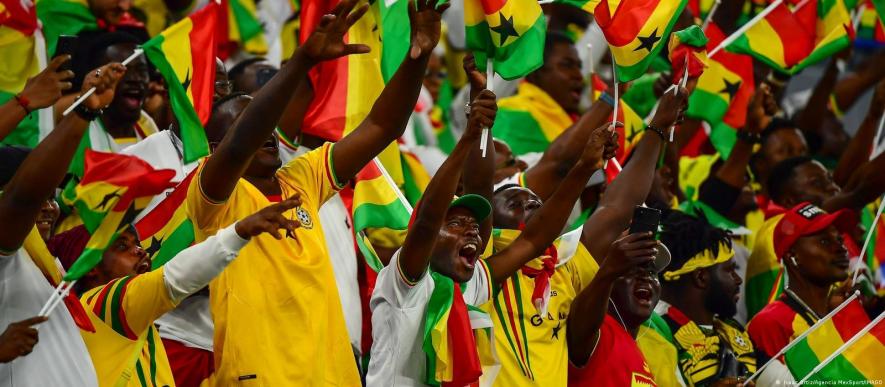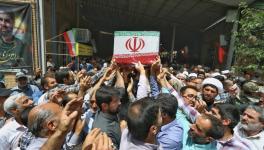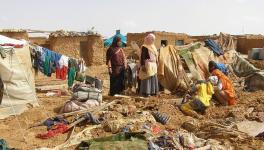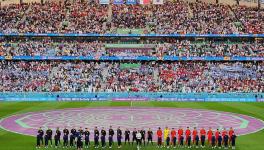World Cup: Why Has No African Team Ever Reached a Semifinal?

Since its inauguration in 1930, 13 African nations have participated in the World Cup. Only three of them have reached a quarterfinal: Cameroon (1990), Senegal (2002) and Ghana (2010). None of them have ever made a semifinal.
African players are currently shaking up Europe's domestic football scene like never before, with many among the world's elite. So why are their national teams on the African continent lagging behind?
"In recent years, African players have been more and more competitive, playing for some of the best clubs in the world and even competing for the Ballon d'Or," says former Moroccan international Yacine Abdessadki. "This enriches African football."
But he thinks there are still other factors holding African teams back at international level.
The role of the psyche
The former Strasbourg and SC Freiburg winger believes that African teams rely too heavily on the talent of their biggest stars whilst neglecting other parts of the game.
"Culturally, in Africa, you tend to not work on things that have long been standards in Europe or South America," he explains, "especially mental aspects."
For Abdessadki, even the best player in the world doesn't know what to do with the ball in stressful situations. It's a question of mental preparation, which directly correlates with performances on the pitch.
"Teams like Spain, France, Belgium or Brazil always play the ball out very cleanly," he says. "Even under pressure, they never force the ball, but stick to their preferred approach. Less well-prepared teams, on the other hand, tend to just clear the ball as far as possible in stressful situations."
Developing a vision
Another problem facing African national teams is a lack of clear perspective and long-term planning.
"You can't suddenly enter a tournament one day and then set a lofty target like reaching the quarterfinal. If you do that, then it's too late," says Karim Haggui.
For the former Tunisian defender, who played for Bayer Leverkusen, Hannover 96 and Fortuna Düsseldorf among others, African football lacks long-term development plans.
"There has to be a training strategy," he says. "You have to work on raising the level of football in Africa, you have to invest in the training of coaches."
It's an opinion shared by former Schalke and Wolfsburg defender Hans Sarpei. The 36-time Ghana international believes that African federations need to be more focused, set a goal like reaching a World Cup semifinal and give themselves 12 years to achieve it.
"There is no 100% guarantee that this will work," he says. "But if you look at Germany or even France, you see there are nations that work with that kind of plan."
Fewer resources, fewer chances
Carefully building a team, training competent personnel and implementing a project with all the technical, physical and mental work required takes time, but above all, money. In this respect, African teams are still light years away from their European or South American counterparts.
In 2021, the total budget of the French Football Federation (FFF) was just over €249 million ($257.1 million), with the share for top-level sport accounting for around €65 million. By way of comparison, the budget of the Cameroonian football association FECAFOOT in 2020 was the equivalent of just €12.7 million.
However, the lack of funds is not the only reason for poor performances at previous World Cups. For Abdessadki, it is also due to the number of participating teams from Africa.
"It's a question of probability," he says. "There are fewer African teams at World Cups than European or South American teams. So, statistically, it's less likely that one of these teams can make it to the final four."


Scandal: Ghana came closest of any African team to reaching a World Cup semifinal in 2010, but Uruguay's Luis Suarez intentionally stopped the ball on the line with his hands, before Asamoah Gyan missed the subsequent penalty in the final minute of extra time. Ghana went on to lose on penaltiesImage: AP
Odds stacked against Africa
Up until France 1998, when five slots were reserved for the African federation for the first time, only three African teams had the right to compete with the world's best. It meant that even the most consistent teams lacked experience at the highest level.
With eight participations, Cameroon has the longest World Cup track record of any African nation but, as Haggui points out: "That's not bad, but it's only half as much as some of the top South American or European teams."
For Ricardo Faty, experience is also a key factor.
"Ghana came very close to reaching the semifinals against Uruguay in 2010 but I think they lacked experience," says the former Senegal international, but he believes that could change this year in Qatar.
"I really believe that this year there are teams like Senegal or even Cameroon that have enough talent and experience to take that step," he says. "Especially thanks to the presence of players who play for the biggest clubs in Europe."
A slightly different pressure
But beware of expectations, which Hans Sarpei says are greater in Africa than elsewhere.
"In Germany, you hope the national team wins the World Cup. In Africa, however, winning is a must," he says. "Most African players play in Europe and are able to handle pressure. But it is something completely different when a whole country is expecting victory."
"They feel the pressure not only for themselves but also for their families. When you're eliminated, you know you can't go back to your home country for the first time, you fly back to Europe where you play."
In Russia in 2018, no African team made it out of the groups for the first time since 1982. This year in Qatar, the pressure is on Senegal, Cameroon, Ghana, Tunisia and Morocco to ensure that there is no repeat.
Edited by Matt Ford
Get the latest reports & analysis with people's perspective on Protests, movements & deep analytical videos, discussions of the current affairs in your Telegram app. Subscribe to NewsClick's Telegram channel & get Real-Time updates on stories, as they get published on our website.
























